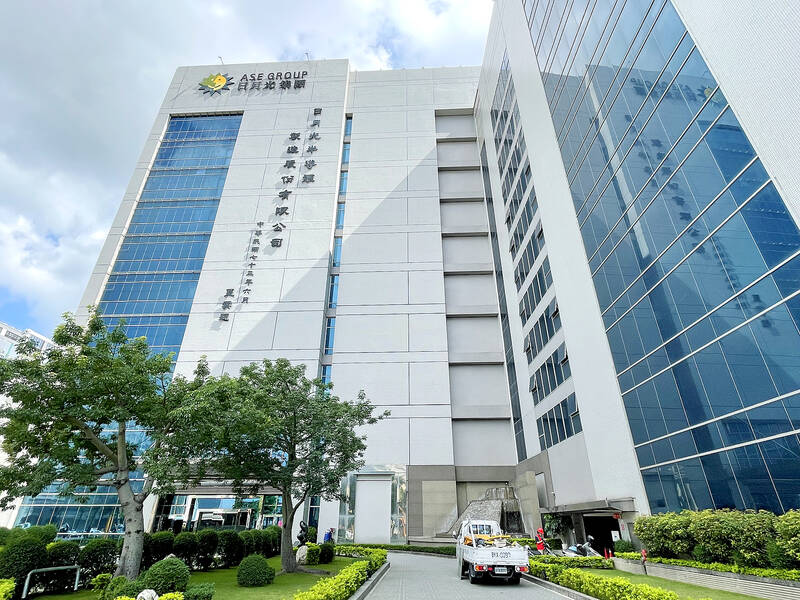ASE Technology Holding Co (ASE, 日月光投控), the world’s biggest chip assembly and testing service provider, yesterday said it is investing NT$17.6 billion (US$578.6 million) to build a new advanced chip packaging facility in Kaohsiung to cope with fast-growing demand from artificial intelligence (AI), high-performance-computing (HPC) and automotive applications.
The new fab, called K18B, is to commence operation in the first quarter of 2028, offering chip-on-wafer-on-substrate (CoWoS) chip packaging and final testing services, ASE said in a statement.
The fab is to create 2,000 new jobs upon its completion, ASE said.

Photo: CNA
A wide spectrum of system-level chip packaging technologies would be available at the new factory, from new panel-level packaging technology, dubbed fan-out chip-on-substrate (FOCoS), to copper pillar bump and flip-chip ball grid arrays for CoWoS and chiplets, it said.
ASE on its Web site said its FOCoS technology is suitable for large package sizes and packages with high input-output density that are designed for networking and server applications.
FOCoS is one of the panel-level packaging technologies that are under development by multiple companies, including Taiwan Semiconductor Manufacturing Co (台積電) and memory chip packaging service provider Powertech Technology Inc (力成科技).
“As advanced chip packaging technology plays a growingly critical role in the overall semiconductor value chain, ASE is committed to further its investment in the newest technology and equipment to satisfy the enormous demand from global customers in the AI and HPC areas,” ASE senior vice president Mike Hung (洪松井) said in the statement.
“The construction of the K18B facility marks a new milestone for the company in deploying advanced packaging technology. In addition, it shows that we are proactively responding to the market’s [growth] momentum. Furthermore, it means Taiwan will continue to safeguard its leading position in the global semiconductor industry,” the statement said.
The new investment came as ASE told investors in July that it is to accelerate advanced packaging and testing capacity investment at home to mitigate tight supply.
All of its leading-edge capacity in Taiwan is fully utilized, it said.
ASE would boost equipment capital expenditure by up to 16 percent for this year to about US$3 billion to fund the capacity expansion, including some new areas such as final test, burn-in and system-level test technologies.
ASE’s new chip packaging facility would further enhance an extensive semiconductor cluster in Kaohsiung, including suppliers of raw materials, equipment and chip designs, the Ministry of Economic Affairs said.
Those companies include TSMC, Advanced Micro Devices Inc, Lam Research Corp, Applied Materials Inc, ASML Holding NV, Merck Group and Entegris Inc, the ministry said.

Shares in Taiwan closed at a new high yesterday, the first trading day of the new year, as contract chipmaker Taiwan Semiconductor Manufacturing Co (TSMC, 台積電) continued to break records amid an artificial intelligence (AI) boom, dealers said. The TAIEX closed up 386.21 points, or 1.33 percent, at 29,349.81, with turnover totaling NT$648.844 billion (US$20.65 billion). “Judging from a stronger Taiwan dollar against the US dollar, I think foreign institutional investors returned from the holidays and brought funds into the local market,” Concord Securities Co (康和證券) analyst Kerry Huang (黃志祺) said. “Foreign investors just rebuilt their positions with TSMC as their top target,

REVENUE PERFORMANCE: Cloud and network products, and electronic components saw strong increases, while smart consumer electronics and computing products fell Hon Hai Precision Industry Co (鴻海精密) yesterday posted 26.51 percent quarterly growth in revenue for last quarter to NT$2.6 trillion (US$82.44 billion), the strongest on record for the period and above expectations, but the company forecast a slight revenue dip this quarter due to seasonal factors. On an annual basis, revenue last quarter grew 22.07 percent, the company said. Analysts on average estimated about NT$2.4 trillion increase. Hon Hai, which assembles servers for Nvidia Corp and iPhones for Apple Inc, is expanding its capacity in the US, adding artificial intelligence (AI) server production in Wisconsin and Texas, where it operates established campuses. This

US President Donald Trump on Friday blocked US photonics firm HieFo Corp’s US$3 million acquisition of assets in New Jersey-based aerospace and defense specialist Emcore Corp, citing national security and China-related concerns. In an order released by the White House, Trump said HieFo was “controlled by a citizen of the People’s Republic of China” and that its 2024 acquisition of Emcore’s businesses led the US president to believe that it might “take action that threatens to impair the national security of the United States.” The order did not name the person or detail Trump’s concerns. “The Transaction is hereby prohibited,”

Garment maker Makalot Industrial Co (聚陽) yesterday reported lower-than-expected fourth-quarter revenue of NT$7.93 billion (US$251.44 million), down 9.48 percent from NT$8.76 billion a year earlier. On a quarterly basis, revenue fell 10.83 percent from NT$8.89 billion, company data showed. The figure was also lower than market expectations of NT$8.05 billion, according to data compiled by Yuanta Securities Investment and Consulting Co (元大投顧), which had projected NT$8.22 billion. Makalot’s revenue this quarter would likely increase by a mid-teens percentage as the industry is entering its high season, Yuanta said. Overall, Makalot’s revenue last year totaled NT$34.43 billion, down 3.08 percent from its record NT$35.52